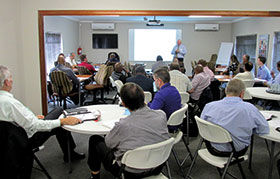

On the 8th of March, a half-day workshop organised by the South African Institute of Security (SAIS) brought together a cross section of leading role players to identify and discuss issues pertaining to education and training in the security sector.
Chaired by SAIS chairman, Dave Dodge, the session featured
presentations by Bruce Mohamed of the Quality Council for Trades and Occupations (QCTO), Professors Kris Pillay and George Govender from UNISA, Siemens’ Andrew Kelly presenting on the International Security Management Institute’s (ISMI) offering, Jesca Liphadzi from the Association of Certified Fraud Examiners (ACFE), and Colin Ackroyd summarising the role of ISO and SABS standards.
While all presentations were expertly executed and well received by attendees, there were notable and regrettable absentees in the form of representatives from the Private Security Industry Regulatory Authority (PSIRA), the Safety and Security, Sector Education & Training Authority (SASSETA), the Security Association of South Africa (SASA) and the South African Intruder Detection Services Association (SAIDSA), each of whom was booked not only to attend but also to give a presentation.
The SAIS also used the occasion to launch a programme through which it will endorse training courses which it deems to be of particular value to its members. Adjudication of qualifying courses will be performed by SAIS committee members including the aforementioned UNISA professors. The first such endorsement and currently the only one of its kind in South Africa for this specific market, was handed to Crest Advisory Africa’s risk management course, a certificate in honour of which was accepted by Crest’s CEO, Nico Snyman.
QCTO – Quite Cumbersome; Too Onerous?
Established in 2010 in terms of the Skills Development Act, the role of the QCTO is to oversee the design, implementation, assessment and certification of occupational qualifications on the Occupational Qualifications Sub-Framework (OQSF). Incepted by government to regulate and qualify a skilled and capable workforce, QCTO manages the SETAs as well as several professional bodies.
Although QCTO’s mission of developing a more robust qualifications framework is widely viewed as positive, and even necessary, it is not immune to controversy. Criticisms that have been levelled at it include lack of progress, postponement of implementation timelines, overlapping of skills development providers’ accreditation end dates and SETA licence end dates, and the negative effects that it will have on private providers, with some in the industry going as far as suggesting that the entire process of migrating to QCTO’s structures is doomed to failure.
After his presentation on QCTO’s progress and the implications it will have for the security sector, Bruce Mohamed fielded a number of questions from the audience which illustrated a keen interest in the topic, and also a dose of consternation. One issue that was raised was a concern that employers will ultimately be left to foot the bill for their skills development providers’ transitioning costs. Another was the fact that Mohamed repeatedly called on the audience to drive change by pursuing the issue with their providers; needless to say, industry, on the other hand, would prefer QCTO to take a more top-down approach to propagating its directives.
Let’s be professional about this
Following the final presentation of the day, one member of the audience (a representative of Eskom) spoke up to express his summation of the situation currently facing the security sector when it comes to training and education. To paraphrase his analogy: “I feel like a diner in a restaurant. My waiter has shown me to my table and presented me with the menu. Now, having chosen and ordered my meal, I’m left waiting, hungry and with no explanation as to what’s causing the delay or when I can expect to have my appetite sated.”
Hijacking this analogy, it could be further argued that the waiter in question has advised that, in order to ensure your meal is prepared to your satisfaction, your best bet is to stroll into the kitchen and tell the chef how you want it done, and lend him a hand with the cooking while you’re there. And don’t be surprised when the restaurant adds a mandatory gratuity charge to your bill.
In conclusion, said Eskom representative urged the importance of forming a professional body representing the security sector – a familiar refrain that was echoed by many of the other workshop delegates. Applying for the issuance of such a designation by the South African Qualifications Authority (SAQA) requires no shortage of leg work (and paperwork), but surely an industry with such a surfeit of associations, institutes and other bodies, coupled with the critical nature of private security in South Africa, carries a loud enough voice to be heard.
PSIRA did in fact begin consulting with relevant stakeholders after announcing last year that it would take up the flag of forming a professional body in response to similar calls from across the sector. Their unfortunate absence from this latest workshop has left the security sector wondering who will champion the cause, and how soon.
For more information, contact Dave Dodge, chairman@instituteofsecurity.co.za, or Rosemary Cowan, sais@instituteofsecurity.co.za, +27 (0)11 455 3157, www.instituteofsecurity.co.za.
© Technews Publishing (Pty) Ltd. | All Rights Reserved.